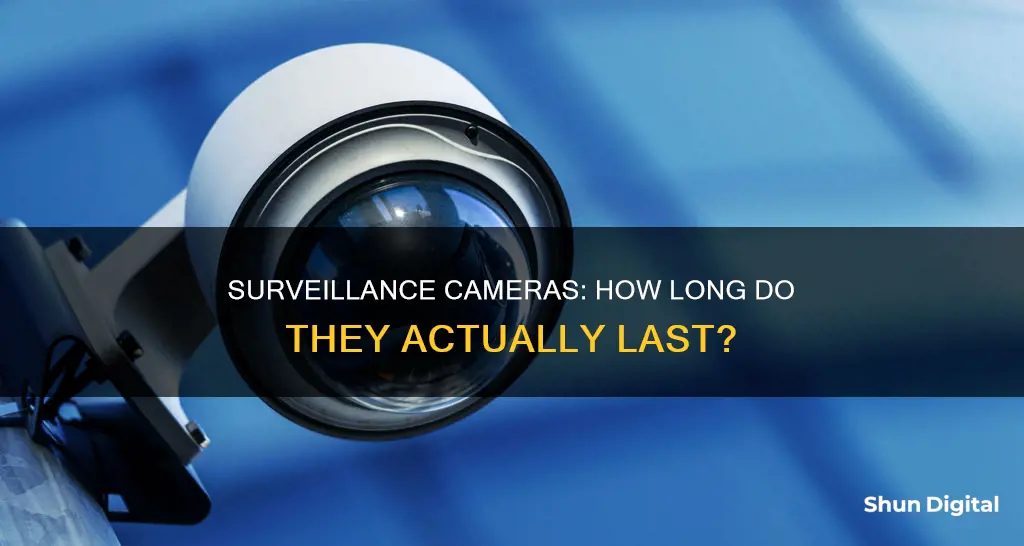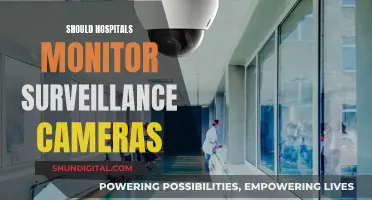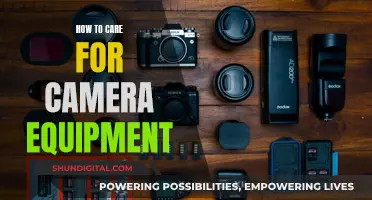
The lifespan of surveillance cameras is influenced by several factors, including the type of camera, its quality, environmental conditions, and maintenance. On average, commercial-grade security cameras last between five to ten years, but this duration can be extended with proper care and maintenance. For instance, high-quality cameras from reputable manufacturers tend to outlast cheaper models, and regular maintenance, such as cleaning lenses and updating firmware, can help extend the life of security cameras. Additionally, the type of camera, such as PTZ cameras with moving parts or fixed-lens cameras with a simpler design, also impacts durability and lifespan.
| Characteristics | Values |
|---|---|
| Lifespan | 2-10 years |
| Factors affecting lifespan | Camera type, quality, environmental factors, maintenance and upkeep |
| Camera type | Analog, digital, IP, NVR, DVR, PTZ, fixed-lens |
| Camera quality | Higher-quality cameras have better materials and components, making them less prone to failure. |
| Environmental factors | Temperature, humidity, exposure to elements |
| Maintenance and upkeep | Routine maintenance includes cleaning the lens, replacing worn components, and checking for damage. |
What You'll Learn

Commercial-grade security cameras last five to ten years
Commercial-grade security cameras typically last between five to ten years. However, this duration can vary depending on several factors, including build quality, environmental conditions, and maintenance.
Build quality is a critical factor in determining the longevity of security cameras. High-quality cameras manufactured by reputable companies, such as Avigilon, often outlast their cheaper alternatives. While these high-quality cameras may be more expensive upfront, they prove to be more cost-effective in the long run.
Environmental conditions, such as exposure to extreme temperatures, moisture, and other weather conditions, can also significantly impact the lifespan of security cameras. For instance, outdoor security cameras are more susceptible to wear and tear due to their constant exposure to the elements. To enhance the durability of outdoor cameras, it is advisable to use weatherproof cameras with an IP (Ingress Protection) rating of IP65 or higher.
Additionally, regular maintenance plays a vital role in extending the lifespan of security cameras. Simple tasks like cleaning lenses, checking for loose connections, and updating firmware can help preserve the functionality and performance of these devices. Proper installation by certified technicians is also crucial, as it ensures that the cameras are positioned correctly and securely, optimizing their effectiveness and maintaining warranty agreements.
In summary, commercial-grade security cameras are designed to be robust and enduring, with an average lifespan of five to ten years. However, by considering factors such as build quality, environmental conditions, and regular maintenance, it is possible to maximize the longevity and functionality of these essential security devices.
Kodak Camera Battery Drain: Why It Happens and How to Fix It
You may want to see also

Camera type, quality, environment, and maintenance impact lifespan
The lifespan of surveillance cameras depends on several factors, including camera type, quality, environment, and maintenance.
Camera Type
The type of camera can significantly impact its durability and lifespan. PTZ cameras, for example, have moving parts that require more maintenance and have shorter lifespans due to wear and tear. On the other hand, most fixed-lens cameras have a simpler design that gives them relatively longer lifespans when properly maintained.
Camera Quality
The quality of a security camera also plays a pivotal role in determining its longevity. High-quality cameras from trusted manufacturers tend to outlast their cheaper counterparts. While investing in top-notch cameras may be more costly initially, it can pay off in the long run.
Environment
Environmental conditions, especially for outdoor security cameras, can significantly impact a camera's lifespan. Exposure to extreme temperatures, moisture, and other weather conditions can accelerate wear and tear. Therefore, it is advisable to use weatherproof cameras with an IP (Ingress Protection) rating of IP65 or higher for outdoor durability.
Maintenance
Regular maintenance can extend the life of security cameras. Simple tasks like cleaning lenses, checking for loose connections, and updating firmware can help preserve their functionality and performance. Proper installation by certified technicians is also important as it ensures cameras are positioned correctly and securely, optimizing their effectiveness and longevity.
Mastering Camera Focus: Measuring Techniques for Photographers
You may want to see also

Analog cameras have a shorter lifespan than digital cameras
The lifespan of a surveillance camera depends on several factors, including whether it is consumer-grade or professional-grade, its placement, and the installation techniques used. While the durability of surveillance cameras can vary, analog cameras generally have a shorter lifespan compared to their digital counterparts.
Analog cameras, also known as CCTV cameras, store footage in a digital format using devices like DVRs (Digital Video Recorders). These cameras tend to have shorter lifespans due to their reliance on older technology and storage formats. The media used for storage in analog cameras, such as floppy disks, CDs, and memory sticks, can become obsolete over time, making it challenging to record or transfer images. Additionally, the image quality of early analog cameras was often inferior to their digital counterparts, and they may not have the same level of durability or vulnerability to other problems.
On the other hand, digital cameras have benefited from technological advancements, including CPUs, processors, sensors, and other electronics. While these additional components have made digital cameras more vulnerable to problems, they have also contributed to their improved image quality and functionality. Digital cameras offer astonishing image quality that surpasses that of analog cameras.
The rapid pace of technological advancements also contributes to the shorter lifespan of analog cameras. With processors and sensor technology constantly evolving, analog cameras can quickly become outdated. In contrast, digital cameras can integrate these advancements, resulting in superior performance and longer lifespans.
The difference in lifespan between analog and digital cameras can be attributed to various factors, including media obsolescence, image quality, technological advancements, and the integration of additional electronics. While analog cameras may still function, their limitations and the challenges associated with storage media can shorten their practical lifespan compared to the more versatile and adaptable digital cameras.
Battery Pack Cameras: Powering Remote Photography
You may want to see also

Proper installation by certified technicians is important
The lifespan of a security camera depends on various factors, including its grade, housing material, installation techniques, and environmental conditions.
When it comes to ensuring the longevity and optimal performance of surveillance cameras, proper installation by certified technicians is of utmost importance. Here are several reasons why:
Product Knowledge and Expertise
Certified technicians possess extensive knowledge about different camera models and their unique specifications. They are trained to follow the manufacturer's guidelines and best practices for installation, ensuring that each camera is mounted securely and positioned optimally. This includes adjusting camera angles, fields of view, and considering lighting conditions to capture clear and relevant footage.
Strategic Placement
Strategic placement of surveillance cameras is crucial for effective monitoring. Certified technicians will carefully assess the premises, taking into account potential blind spots, high-risk areas, and environmental factors that may impact the cameras. They will recommend and implement the best locations for indoor and outdoor cameras, ensuring optimal coverage of entry and exit points, high-value assets, and other security focus areas.
Technical Proficiency
The installation process involves technical tasks such as running cabling, connecting video and power cables, configuring camera settings, and integrating the cameras with a central Network Video Recorder (NVR) or Digital Video Recorder (DVR) system. Certified technicians have the skills and experience to handle these tasks efficiently, ensuring that the cameras function properly and comply with relevant regulations.
Warranty and Longevity
Proper installation by certified technicians can also impact the longevity of the surveillance cameras and the validity of their warranties. Technicians will ensure that the cameras are mounted securely and protected from potential damage caused by weather conditions or vandalism. This can help extend the lifespan of the equipment, reducing the need for frequent replacements or repairs.
System Testing and Maintenance
In addition to installation, certified technicians can provide ongoing maintenance and support for the surveillance system. They can conduct thorough testing to verify functionality, image quality, and coverage. They will also be able to promptly identify and address any issues, such as blind spots, obstructions, connectivity problems, or power failures, ensuring that the system operates effectively over an extended period.
In summary, proper installation by certified technicians is crucial for the optimal performance, longevity, and maintenance of surveillance cameras. Their expertise ensures strategic placement, adherence to manufacturer guidelines, and compliance with regulations, enhancing the effectiveness of the security measures implemented.
Creating Bokeh Effects: Camera Raw 14's Magic
You may want to see also

High-quality cameras and regular maintenance extend lifespans
The lifespan of surveillance cameras is influenced by various factors, including build quality, environmental conditions, and maintenance. While the average lifespan of commercial-grade security cameras is around five to ten years, high-quality cameras that are well-maintained can last significantly longer.
High-quality cameras from trusted manufacturers are designed to be durable and typically outperform their cheaper counterparts in terms of longevity. They are built with high-grade components and materials that can withstand the rigours of continuous use and exposure to the elements. For instance, metal housings can withstand long-term UV exposure, ensuring the camera's exterior remains intact even after years of sun exposure.
Regular maintenance is also key to extending the lifespan of surveillance cameras. Simple tasks like cleaning lenses and casings, checking for loose connections, and updating firmware can help preserve the camera's functionality and performance. Proper maintenance can mitigate the effects of environmental factors, such as extreme temperatures, moisture, and other weather conditions, which can otherwise accelerate wear and tear.
In addition to maintenance, professional installation plays a crucial role in optimising camera lifespans. Certified technicians ensure that security cameras are positioned correctly and securely, maximising their effectiveness and adhering to warranty requirements. Working with a local installer provides the added benefit of having a nearby team familiar with the system, ready to provide support when needed.
By investing in high-quality cameras and prioritising regular maintenance, organisations can extend the lifespan of their surveillance equipment, making it a worthwhile long-term investment for enhanced security.
AI Camera Focus: Revolutionizing Photography with Intelligence
You may want to see also
Frequently asked questions
Surveillance cameras typically last between five to ten years, but this depends on factors like build quality, environmental exposure, and maintenance.
The type of camera, quality, environmental factors, and maintenance and upkeep can all impact the lifespan of a surveillance camera.
Yes, consumer-grade cameras usually last two to four years, while professional-grade cameras can last seven to ten years.
Higher-quality cameras tend to have better materials and components, making them less prone to failure. They also often come with better warranties and support, which can further extend their lifespan.
Environmental factors such as extreme temperatures, moisture, and other weather conditions can accelerate the wear and tear of outdoor surveillance cameras. Therefore, it is advisable to use weatherproof cameras with a high IP (Ingress Protection) rating for outdoor use.







